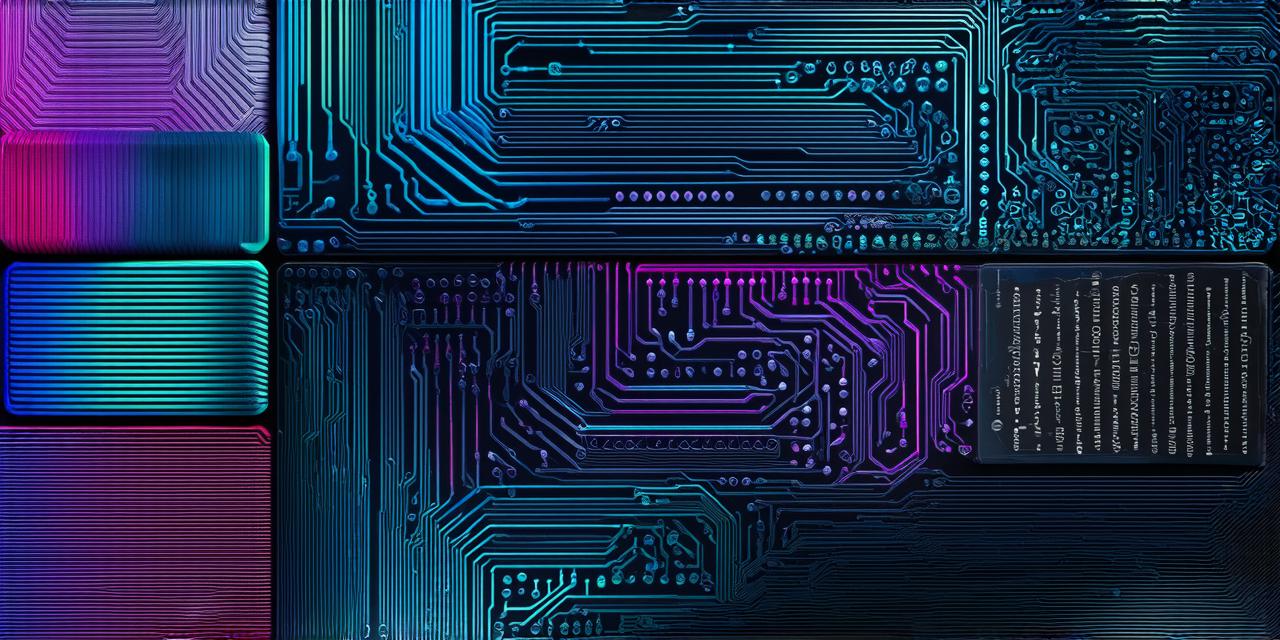Here’s the corrected HTML code for the article:
Blockchain technology is transforming industries and disrupting traditional ways of doing business. With its decentralized and secure nature, it’s no surprise that more and more people are becoming interested in learning how to develop blockchain applications. But what skills do you need to be a successful blockchain developer? In this article, we will explore the necessary skills for a blockchain developer and provide examples of how they can be applied in real-world scenarios.
1. Programming Skills
The first and most obvious skill required to become a blockchain developer is programming proficiency. Blockchain development requires knowledge of multiple programming languages, including Solidity (for Ethereum), Java/Go/C++ for other smart contract platforms, Python for backend development, and frontend frameworks like React or Angular.
Programming skills are crucial in blockchain development as they allow you to write the code that will run on the blockchain. It’s important to have a strong foundation in programming concepts such as data structures, algorithms, and object-oriented design patterns.
For example, consider the case of a blockchain developer working on a decentralized finance (DeFi) application. They would need to be proficient in Solidity programming language to write smart contracts that will run on the Ethereum blockchain. These smart contracts would handle transactions and ensure the integrity of the financial system.
1. Cryptography and Security
Another important skill required for blockchain development is cryptography and security. Blockchain technology is built on cryptographic principles, and a deep understanding of these concepts is essential to developing secure and reliable blockchain applications.

Blockchain developers must be familiar with concepts such as public-key cryptography, hash functions, digital signatures, and consensus algorithms. They should also have knowledge of the various security threats that can affect blockchain networks and how to mitigate them.
For instance, consider a blockchain developer working on a supply chain management system. They would need to be familiar with cryptographic techniques to ensure the confidentiality, integrity, and authenticity of data stored on the blockchain. They should also have knowledge of secure communication protocols like SSL/TLS to protect the network from attacks.
1. Blockchain Architecture and Design
Blockchain architecture and design are crucial skills for a successful blockchain developer. Understanding how blockchains work and how they can be designed to meet specific use cases is essential to developing efficient and scalable blockchain applications.
A blockchain developer should be familiar with different types of blockchain architectures such as public, private, and hybrid networks. They should also know how to design and implement smart contracts, decentralized applications (DApps), and tokenomics models.
For example, consider a blockchain developer working on a supply chain management system for a fashion brand. They would need to understand the architecture of the Ethereum blockchain and design a smart contract that will store information about the origin of materials used in the production of clothing. They should also be familiar with the tokenomics model used to incentivize stakeholders and ensure compliance with sustainability goals.
1. Data Structures and Algorithms
Blockchain development requires a strong foundation in data structures and algorithms. These concepts are essential for developing efficient and scalable smart contracts that can handle large volumes of data and complex computations.
A blockchain developer should be familiar with data structures such as arrays, linked lists, stacks, queues, and trees. They should also know how to use algorithms like sorting, searching, and optimization to improve the performance of their code.
For example, consider a blockchain developer working on a decentralized exchange (DEX) application. They would need to be familiar with data structures like binary search trees and hash tables to implement efficient search and retrieval algorithms for orders on the DEX.
1. DevOps and Cloud Computing
DevOps and cloud computing are becoming increasingly important skills for blockchain developers. With the rise of cloud-based blockchain platforms, it’s essential to have knowledge of DevOps tools and practices to ensure smooth deployment and maintenance of blockchain applications.
A blockchain developer should be familiar with cloud computing services like Amazon Web Services (AWS) or Microsoft Azure, and DevOps tools like Docker, Kubernetes, and Jenkins. They should also know how to use containerization technologies to deploy and manage blockchain applications in the cloud.
For instance, consider a blockchain developer working on a decentralized finance application. They would need to be familiar with cloud computing services like AWS and DevOps tools like Kubernetes to ensure scalability and availability of the DApp. They should also know how to use containerization technologies like Docker to deploy and manage smart contracts on the Ethereum blockchain.
1. Collaboration and Communication Skills
Blockchain development requires excellent collaboration and communication skills. Blockchain developers often work in cross-functional teams with professionals from different backgrounds, such as finance, law, and operations. Effective communication is essential to ensure that everyone on the team is on the same page and understands their roles and responsibilities.
A blockchain developer should be able to communicate effectively with technical and non-technical stakeholders. They should also be familiar with Agile development methodologies and be comfortable working in a fast-paced, iterative environment.
For example, consider a blockchain developer working on a supply chain management system for a retail company. They would need to collaborate with professionals from different departments like logistics, finance, and procurement to ensure that the blockchain application meets their needs. Effective communication is essential to ensure that everyone on the team understands the requirements and can contribute their expertise.
Conclusion
Becoming a successful blockchain developer requires a combination of technical skills and soft skills. Programming proficiency, cryptography and security knowledge, blockchain architecture and design expertise, data structures and algorithms, DevOps and cloud computing skills, and collaboration and communication skills are all essential to developing efficient and scalable blockchain applications.
As blockchain technology continues to evolve, the demand for skilled developers is likely to increase. It’s important for individuals interested in becoming a blockchain developer to invest in their skills and stay up-to-date with the latest developments in the field. By doing so, they can position themselves for success and contribute to the growth of this exciting and transformative technology.
